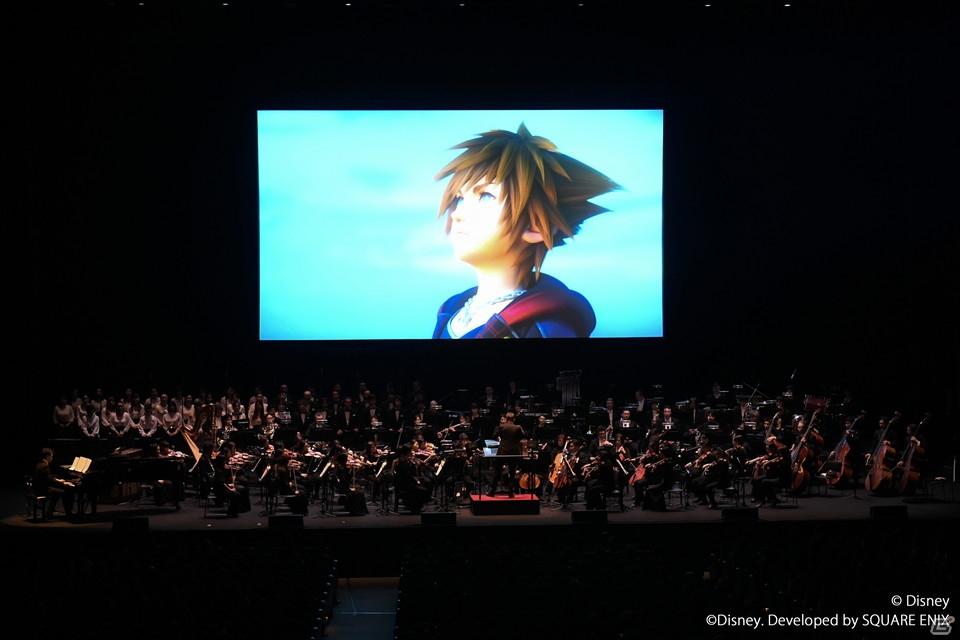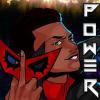Kingdom Hearts Director Tetsuya Nomura and Composer Yoko Shimomura were interviewed back in February about the Kingdom Hearts -World of Tres- concert tour about the tour itself, the process of having the soundtracks for the games created and approved, and more. The interview was conducted by Tomoko Kanemaki and Taketeru Sunamori.
The transcript of the interview is listed in the official -World of Tres- brochure. You can also view the interview below. [Thanks to KH13 News Team member Leamax for providing the transcript.]
QuoteAll the logos are matched to the season
-When were the plans for this concert finalized?
Nomura: Plans were pretty much finalized by the time of the Kingdom Hearts Orchestra -World Tour- took place.
Shimomura: I actually have a question for you. Tetsu-san [Nomura]. Why is the logo for this concert pink?
Nomura: Because it’s Spring. All the logos are matched to the season. The logo for Kingdom Hearts Concert -First Breath- was blue because it was Summer, World Tour was Spring, so it was a verdure [Green] color.
Shimomura: Interesting!
-With regard to song selection, who primarily held the reins?
Shimomura: The selections were made based on Tetsu-san’s vision of how it should go blended in with my own vision of how it should go.
Nomura: The basic blocks were decided by me. The general structure I came up was, Part 1 would all be songs from titles preceding Kingdom Hearts III [KHIII hereafter], and Part 2 would exclusively feature songs from KHIII.
Shimomura: I initially wanted to do every field and battle theme in KHIII, but I surmised that alone would fill up an entire concert program. But thanks to Tetsu-san’s suggestion, we devised a way to pack everything into Part 2, by arranging a lot of medleys and such. As a result, a massive number of songs were squeezed into the program, leading arrangers and performers to weep. (laughs)
Nomura: I understand the appeal of a concert solely for KHIII, but I had a feeling that the fans wanted to hear other songs as well. That was the reasoning behind this structure. In Part 1, the audience will experience the story leading up to KHIII, and then during the brief rest, they can ponder and reminisce about that story in preparation for KHIII.
Shimomura: Experience the whole story one more time.
Nomura: Exactly. Part 1 can be considered a long prologue.
I wonder how the medleys will turn out.
-With all the music being performed by an orchestra, is there anything in particular that you’re looking forward to?
Shimomura: The songs I wonder about the most when they’re to be played by the orchestra are the songs from Kingdom Hearts: Coded [Coded hereafter].
Nomura: Not KHIII?
Shimomura: The music of KHIII is mostly well-suited for an orchestra, so I’m not concerned. Coded, on the [other] hand, is not well-suited for an orchestra at all, so I’m very curious about how it will play. In that same vein, I think San Fransokyo music played by an orchestra will be very interesting.
Nomura: I wonder how the medleys will turn out, because there are so many songs. But I do also believe it would be better to offer songs and arrangements that the audience can only hear at this event. I mean, if they wanted to hear whole individual pieced , they can listen to the soundtracks.
Shimomura: The total number of songs that will be performed is 77!
Nomura: Aren’t you the one that put in that many songs? (laughs) I just divided the blocks. (laughs)
Shimomura: Indeed (laughs). Kingdom Hearts 3D DDD: Dream Drop Distance (DDD hereafter) was actually not supposed to be a medley. We were planning to only do Dream Eaters, but we just kept adding other songs. So, that leaves Coded, Utada-san (Utada Hikaru)’s song, and Dearly Beloved. Everything else is a medley.
Nomura: Dearly Beloved is the song I asked a retake for during the composition phase, right? When I heard that first version, it wasn’t Dearly Beloved at all. I remember thinking to myself, “What is this strange song?” (laughs)
Shimomura: Ohh! That was the incomplete version of Dearly Beloved. That was a completely different arrangement.
Nomura: So different that its original form was completely lost!
Shimomura: Well, the intro was the same… I did have a strong feeling you wouldn’t accept that version, but I took a gamble and asked you to take a listen. Of course, the only feedback I received was “What is that?” (laughs)
Nomura: It was almost a completely different song! (laughs)
Shimomura: So, eventually we settled down into the current version.
-Any other memorable songs from KHIII?
Nomura: When Shimomura’s songs do pass inspection, they all tend to pass with flying colors. So that just begs the question, “Why can’t you always do that from the beginning?” (laughs)
Shimomura: I keep telling you, that’s because my god said…
Nomura: Un, no. I don’t think so. (laughs)
Shimomura: (In Kansai dialect) My god told me I can't make good songs!
Nomura: What’s with the sudden Kansai-speak? (laughs) See, the thing about Shimomura is, she’s a slow starter. In the first half of the schedule, she has tons of retakes, but then in the second half, she writes these amazing songs and they pass without any retakes.
Shimomura: Oh, you mean the production schedule.
Nomura: What I’m saying is, your first half songs mostly become retakes, while your second half songs are exceptional. That’s always how it is, so every time that happens are exceptional. That’s always how it is, so every time it happens, I say to myself, “Why, oh why can’t she do this from the beginning?” (laughs)
Shimomura: That reminds me, for the Kingdom of Corona, you said, “That song isn’t bad, but it doesn’t feel distinctively Rapunzel.”
Nomura: Isn’t that a great point?
Shimomura: Huh!? I don’t know about that...Anyway, I told you that the harp in the piece symbolized Rapunzel’s flowing golden locks and later I just intensified the harp sound. What ended up happening was, the harpist had a really difficult recording session. (laughs)
Nomura: The songs I ask you to retake always end up becoming memorable classics, so isn’t it all good in the end? (laughs)
Shimomura: Yes, I try to think of it that way. I wrote two boss themes as well and you said one was too “heavy”, so you asked me to “brighten up a little,” remember?
What’s important is that it’s KH-ish
-You are using 3 composers this time. Are these only distinct differences between them?
Nomura: I think this time around, I asked Ishimoto-san [Takeharu Ishimoto] for the most retakes. I think he had a pretty difficult time.
Shimomura: In what sense?
Nomura: Of late, I had mostly been asking him to take care of Final Fantasy-related titles and I felt a lot of his composers were leaning too much in that direction. It’s perfectly understandable, but still, I remember requesting multiple retakes for the Carribean.
Shimomura: The Carribean is a really cool song.
Nomura: It became a cool song because he toiled and persevered through difficult times. Sekito-san [Tsuyoshi Sekito], on the other hand, seemed to breeze through the process.
Shimomura: Wow!
Nomura: ...Wait, maybe there was one song. But really, almost no retakes. The only real issue I remember was in the first song he made-I think it was a Gummi Ship song. It just wasn’t KH-ish, so I asked him to rewrite it several times.
-So, it’s important for songs to be “KH-ish.”
Nomura: Yes, KH-ish...I admit, how to interpret that “ish” is really hard to explain in words (laughs). Put simply, it has to fit the KH world view.
Shimomura: I still don’t fully get it (laughs). But when I was listening to Tetsu-san talk, I was reminded of the time we were working on Kingdom Hearts II [KHII hereafter]. KHIII is a numbered title, so I didn’t want to do the same kind of things we did in Kingdom Hearts Birth By Sleep [BBS hereafter] or DDD; I wanted to get closer to the things we did in Kingdom Hearts I [KH1 hereafter] and KHII. But yes, I agree that it’s difficult to explain “KH-ish”, although cheerful battle music has always been a series hallmark.
-Did the different hardware have any effect on the final product? It is my understanding that KHIII has been released on PlayStation 4 and Xbox One.
Nomura: The quality of the visual and aural expression we are able to put forth has been vastly improved.
Shimomura: Up until KHII, we were using internal sound sources1. We started using streaming technology2 from BBS, and this time around, the big difference was that we used many songs performed by a live orchestra. Up until now, only several of the instruments in a piece were recorded with live sound, or just the song Dearly Beloved, or just the ending. This time, even the field music was performed by a live orchestra.
Nomura: Another thing that was different this time was our dealing with Disney. This time around, many people who were involved in the making the actual films were still active members of their respective titles’ teams, because there are now always possibilities for sequels. What resulted were more varied and in-depth talks regarding the music and the actual game content.
-Did you attend the live orchestra recording sessions, Nomura-san?
Nomura: Only once.
Shimomura: For Dearly Beloved, Face My Fears, and Don’t Think Twice. We’ve asked Tetsu-san to attend recording sessions since KH1.
Nomura: But really, as a layman, there’s no way for me to get deeply involved in the process, so I just mostly watched from the guest seats. I did, however, say one thing to Kaoru Wada when I first went to greet him…
Shimomura: I just knew of this one moment, Tetsu-san, was going to say something, and sure enough, he didn’t disappoint. Wada-san’s solution was that he would “fix it during mixing,” if I recall.
Nomura: There was one part where the sound where the sound was so small, I was a little puzzled about how it was going to be performed at the concert.
Shimomura: There will be a PA system at the concert.
Nomura: Just to make that one part louder?
Shimomura: It’s what we’ve always done. Ideally, I would like to do a concert with a PA system3, but it would be impossible at the Tokyo International Forum, the venue is just too large.
The battle songs are the cornerstones
-Are there any songs in KHIII that you are particularly fond of?
Nomura: I think it’s the battle songs that most effectively reignites memories. I think they all generally have a good feel.
Shimomura: The battle songs are the cornerstone.
Nomura: I think maybe this time, it’s Roxas’ battle song.
Shimomura: The arranger did a fantastic job of transforming in an orchestra piece. I think another one would be the song for the Ansem, Xemnas, Young Xehanort consecutive battle. That was originally my song, but when I heard the new arrangement, I thought it was so cool that I texted, “My nose started bleeding!” to Kawamari-kun4. I can’t believe that I remember vividly. 2 songs that I did for KHII, Vim and Vigor and The Encounter; I remember Tetsu-san praised me so much when I put out the demo!
Nomura: I don’t remember this.
Shimomura: These songs only used in other series installments.
Nomura: Sorry, my hard drive is small, so a lot gets overwritten.
Shimomura: I almost never received praise from Tetsu-san, so I remember it just like it was yesterday.
Nomura: One characteristic of the songs in KH is, all the titles are in English, so they’re hard to memorize (laughs). Why don’t you just name them something like I was Praised 1 and I Was Praised 2?
Shimomura: If I did that, sooner or later I would have to use the title I Was So Very Rejected 4 (laughs).
-What was the first song you wrote this time?
Shimomura: This time, I think it was Hercules, and Monsters, Inc. was somewhere near the end. I’m not given a set order to follow, so I just look at them all and start writing for the one that I first get an idea about. I guess I have it easy that way.
-Conversely, what was the last song you wrote?
Shimomura: The epilogue and the secret. Also, maybe the last recording with a fairly large orchestra was Dearly Beloved and the end credits. As for the secret, I aimed for it to be last minute for a variety of reasons.
Nomura: When I first heard it, I was like, “Oh!” But then I listened to it again carefully, and I began to get it. There sure seems to be a lot of talk surrounding it.
-Finally, a message to the fans and supporters attending the concert.
Nomura: This is just one of those things where you have to see and hear the results for yourself. Concerts require an inordinate amount of preparation. The same could be said for game development I suppose, but one thing to keep in mind is that the work isn’t merely represented in what you see or hear; it’s in the editing process of the visuals. It’s in the hours spent deciding the program structure. Every time we plan a concert, I think to myself, “This is the last one!” I hope that everyone in attendance has a great time.
Shimomura: Just like how a game that took years to make can played to the end in a few dozen hours, we’ve spent a massive amount of time planning this event and packing all the content into 2 hours.
Nomura: With that in mind, please enjoy the show!
-Are you going to make an appearance this time?
Nomura: I’m giving it some serious thought. Maybe I should make an appearance just to do a survey. I can ask people in the audience to raise their hands and such (laughs).
Shimomura: KH fans are all very lighthearted.
Nomura: Just like me, right? (laughs)
Shimomura: What? (laughs)
*Notes:
1 Internal sound source: Most game consoles have an internal instrument (synthesizer) built in that [console] creates sound signals. This is what is called an Internal Sound Source. Consoles that were released after PlayStation continued to have this feature built in.
2Streaming technology: A playback method using pre-recorded sound data, much like a CD. It carries advantages such as not having to consider issues like polyphony, allowing for near unlimited freedom in playback. On the other hand, the hardware specs required to use the technology are very high, thus it took a long time for the game world to adopt it.
3PA system: The sound of a live orchestra is limited in range (the maximum is said to be a 2,000-seat venue). Therefore, concerts in large venues such as the Tokyo International Forum, which boasts 4,000+ seats, require a PA (Public Address) system.
4Kawamori-kun: Keiji Kawamori, A sound manipulator at Square Enix
*Interviewers: Tomoko Kanemaki/Taketeru Sunamori
What was your favorite quotes from the interview? Let us know in the comments below!



Recommended Comments
Join the conversation
You can post now and register later. If you have an account, sign in now to post with your account.